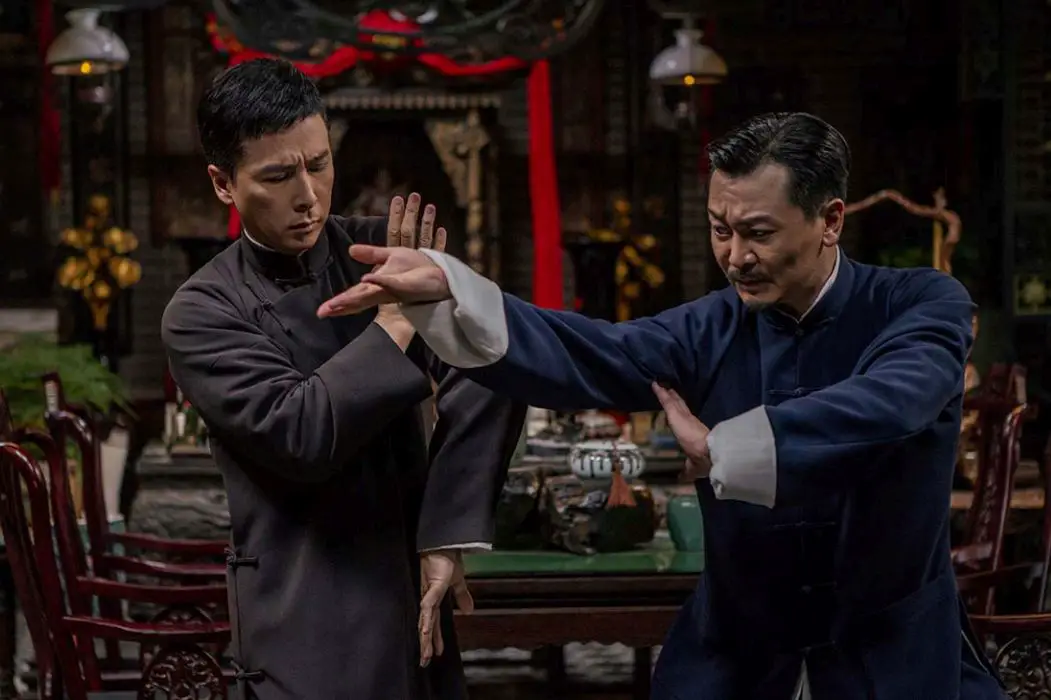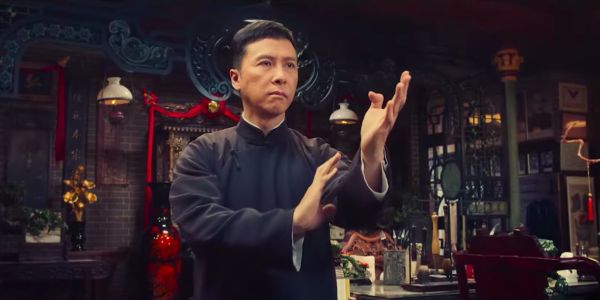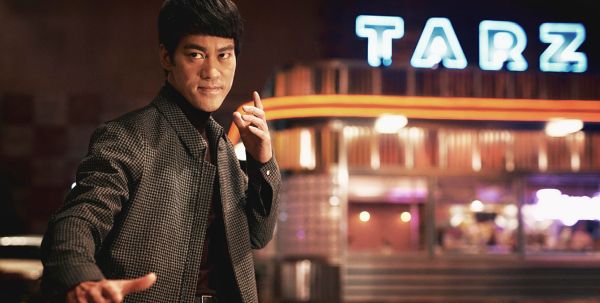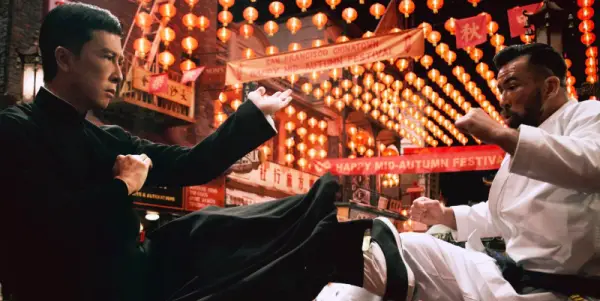IP MAN 4 THE FINALE: A Lackluster End To A Once Great Franchise

Wilson is a cinema enthusiast based out of Toronto, Canada.…
While Hong Kong cinema has long been known for churning out unnecessary sequels and extending the shelf life of dying franchises, the local film industry’s decline over the years has made such practices almost obsolete. And I say almost because we have now been graced with a fourth (and this time, seemingly final) entry of the Wilson Yip helmed/Donnie Yen starring Ip Man series. As a fan of the series and martial arts films in general, it’s hard not to like any film featuring the characterization of Ip Man. But having said that, it’s unfortunately even harder to call this final chapter of the Ip Man saga a successful piece of filmmaking.
Jumping forward from the events of Ip Man 3, the now widowed Ip Man is tasked with raising his defiantly stubborn son, Ip Jun. Although Ip Jun hopes to follow in his father’s footsteps and train in the ways of Wing Chun, he is told to focus on his studies instead. After receiving an invitation from his most acclaimed student Bruce Lee to visit San Francisco for a martial arts competition, Ip Man decides to travel across the continent where he hopes to also find a new school for his son. In San Francisco, there are clearly rising tensions between the Chinese and American communities, with Bruce Lee’s insistence on teaching Wing Chun to non-Chinese students being frowned up by his own people. Ip Man becomes entangled in both these conflicts, all while navigating a tenuous relationship with his son back home.
Fact versus fiction
A major point of contention for all the Ip Man films to date (even the ones not starring Yen) has been around the factual basis of its story lines. For starters, it has now been established that Ip Man didn’t actually meet Bruce Lee until he was much older (in 1953, age 60), and their pedagogical relationship may have been overstated in popular media. Certain elements of Ip Man’s personal life in the films are also known to be factually incorrect, but Yip et al. were certainly afforded some degree of creative license in telling their version of the grandmaster’s story.

Moreover, as with some of the other films based on actual martial artists, these types of films aren’t necessarily meant to be biographical. Rather, their aim is to convey the heroism behind these folklore heroes, who existed as real life people in the past. Examples throughout the history of both Hong Kong and Chinese cinema have introduced superhero-like depictions of figures like Wong Fei Hung, Fong Sai Yuk and Huo Yuanjia. The biographical aspects of these films always existed only to serve the grander heroism story arc. But no matter how ridiculous the plot got, they always aimed to serve this very purpose.
The problem with The Finale is that this purpose seems to have muted itself, to the point where it’s not even completely clear what the film is trying to say. As a biographical piece of narrative, the screenplay really just glosses over the details of the titular character’s personal life. This includes his cancer diagnosis, which plays a big part of the film’s opening sequence, and subsequently not mentioned again until the very end. As an imaginative piece of narrative aiming to further the character’s folklore status in Chinese popular culture, it unfortunately also stumbles in landing any effective punches. The sense of heroism that Ip Man is meant to embody is still palpable throughout the film, but it never reaches the heralding levels of symbolism that the previous films were able to capture so well.
Xenophobia
And this lackluster feeling is perhaps a result of the film trying to squeeze out more emotional substance from its xenophobia storyline than it really should. Whereas the first two Ip Man films effectively tackled the mistreatment of Chinese citizens from both the Japanese and British, respectively, shifting to the Americans in this final chapter was probably a huge misstep. The need to include Bruce Lee’s character and migrate the story to San Francisco didn’t necessitate making racism a focal point of the film again. The filmmakers made a conscious decision to skip the xenophobia train for the third film, and perhaps they should’ve kept one foot off the pedal for this final outing.

But wrenching out national patriotism through buried xenophobia is what made Ip Man such a big hit back in 2008, so from a commercial standpoint, this decision to replay its ‘core values’ is not surprising. And possibly as an indirect throwback to its first two franchise entries, The Finale includes xenophobic scenes with both the Japanese (Chris Collins as a Karate sensei) and Caucasian (Scott Adkins as the Gunnery Sergeant) population. Not only does this feel superfluous, it also falls short of replicating the conviction and emotional resonance of its predecessors. Simply put, it feels like someone doing an old trick with less flare and efficiency.
The final fight
At the end of the day, regardless of the overall narrative, the Ip Man films have always been about the fights. It’s where the first three films have consistently shined, and much of that is thanks to the agile physicality of Yen and the masterful choreography of Yuen Woo Ping. Although there aren’t any knockout set pieces here, there’s certainly an assured level of consistency with all the action sequences. Yen even repeats his repetitive head-punching maneuver (this time, on a brighter lit fighting arena), which is a welcoming, albeit gratuitous throwback to one of the franchise’s most famous scenes. Danny Chan also gets to showcase his best Bruce Lee moves, which is great, with the exception of a nunchucks scene that feels a tad bit forced.

What’s problematic about The Finale’s fight scenes is perhaps the final fight of the film, which unfortunately leaves an unsatisfying taste for any fan of the franchise. While having good choreography is one part of the equation, having a good sparring partner is arguably even more important. And this is by no means a personal attack on Adkins, as I personally find him to be a pretty decent performer on screen. But to serve as the big ‘superstar’ bad guy of the very last Ip Man movie? I just don’t think he quite fits the bill here.
This is a franchise that has brought on the likes of Sammo Hung, Mike Tyson and (then rising star) Max Zhang as a counterpoint to Yen. If they needed an American soldier type persona, couldn’t they of at least gotten Jean-Claude Van Damme? I’m fairly certain he would’ve been available to take on the part. As popular and respected as Adkins might be in the martial arts world, he doesn’t have the kind of legendary status needed to fully punctuate what is ostensibly the final villain of the entire franchise.
Legacy
Even within Hong Kong cinema itself, Ip Man has been portrayed by at least four different actors over the past decade (Donnie Yen, Tony Leung, Anthony Wong and Dennis To), so I doubt this is actually the last time we see the character on screen. And Donnie Yen wasn’t just the first to bring notoriety to the character, he also helped define the essence of the character for this generation and will always be remembered as such. When you ask anyone about Ip Man, it’s hard not to think of Yen as being the quintessential depiction of who the character is – even if the films aren’t completely factual.
The Finale is supposed to be the final chapter of this long and important legacy, but sitting through the film itself, you don’t really get that feeling at all. There’s a nice montage near the end that reflects back on the previous three films, which is both nostalgic and emotionally charged. But this is how the entire movie should’ve felt like. There’s nice callbacks here and there, but the grander sense of this being the end of a franchise that started all the way back in 2008, is sadly missing. Any overarching sense of legacy is almost absent until the closing moments, which truly feels like a wasted opportunity. In the end, Ip Man 4: The Finale simply feels more like a mid-chapter episode, rather than a true finale.
Ip-Man 4: The Finale was released in cinemas on December 25th, 2019. Coming to digital and disc in April 2020.
Does content like this matter to you?
Become a Member and support film journalism. Unlock access to all of Film Inquiry`s great articles. Join a community of like-minded readers who are passionate about cinema - get access to our private members Network, give back to independent filmmakers, and more.
Wilson is a cinema enthusiast based out of Toronto, Canada. He escapes from his day job by writing random thoughts about cinema on the internet. Although he has a longstanding penchant for Hong Kong cinema, he considers himself to be an advocate for Asian cinema in general. He has been attending the Toronto International Film Festival every year since 2005, and more of his work can be found on his website: www.wilson-kwong.com.












